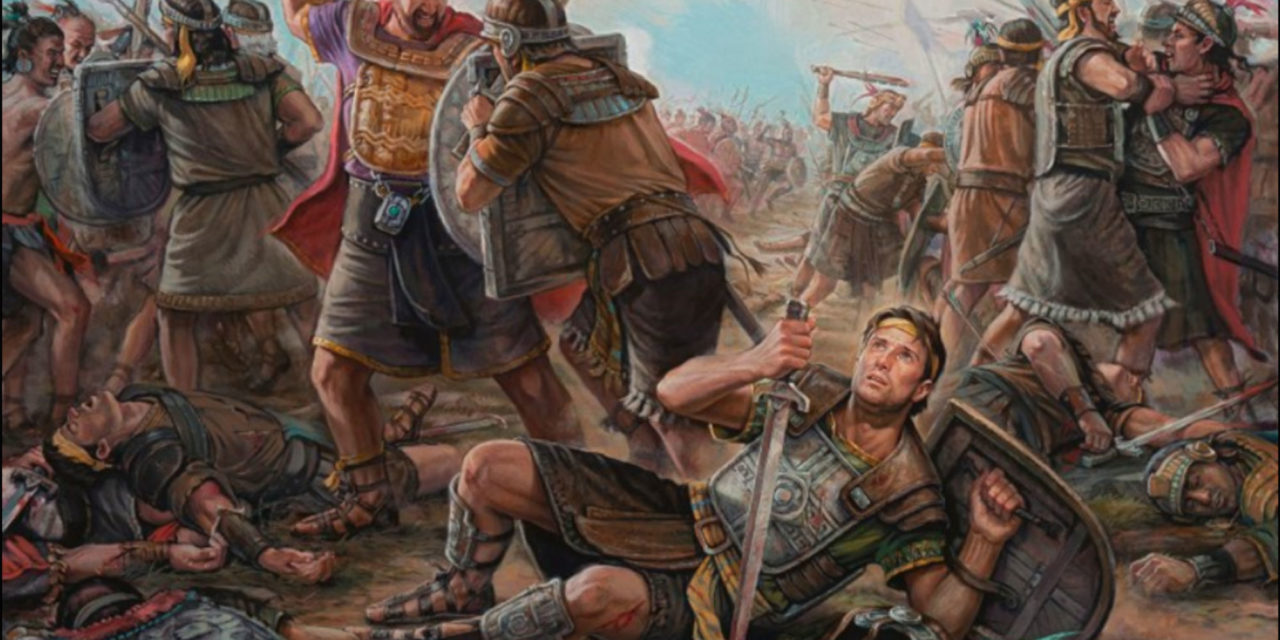To accompany your Come Follow Me study for June 3-9
In addition to reading Mosiah 29-Alma 4, you will enjoy watching the following videos this week:
You will also enjoy reading the following related material from the Book of Mormon Institute Student Manual:
If you would like a Kahoot game related to this material which you could use for personal study or use with your family or your class, click here: https://create.kahoot.it/share/mosiah-29-alma-4/d37c4f63-7689-4efe-867f-7aa5d2f2561d. To use it with a group, after clicking on this link, you will need to log into Kahoot, creating a free account if you have not done so previously, then click on the blue “Start” button. Some of the Kahoot questions may presuppose that the player has read through the suggested answers to the following Points to Ponder and at least has browsed the Institute student manual as well.
Points to Ponder in Mosiah 29-Alma 4
MOSIAH 29
1. What are the advantages of a democracy as opposed to a monarchy? What are the disadvantages? Which form of government do we have in the Church?
2. If democracy is superior to monarchy, why do you suppose inspired Nephite prophets established a monarchy for the first 500 years of Nephite history?
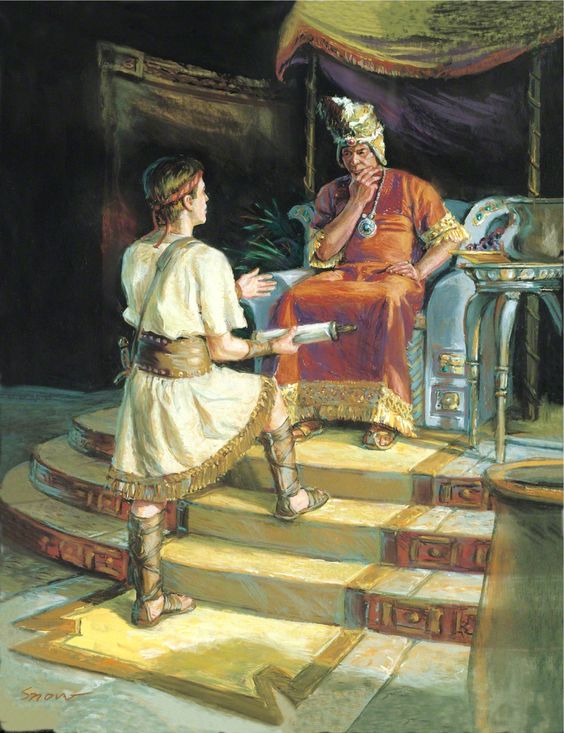
3. What dangers does a nation face when the majority of the people become wicked? Do you feel we have yet reached the point “that the voice of the people doth choose iniquity” in this country? (29:27) Why or why not?
4. How would you feel about President Nelson serving simultaneously as President of the Church and President of the USA? Why was Alma given both positions?
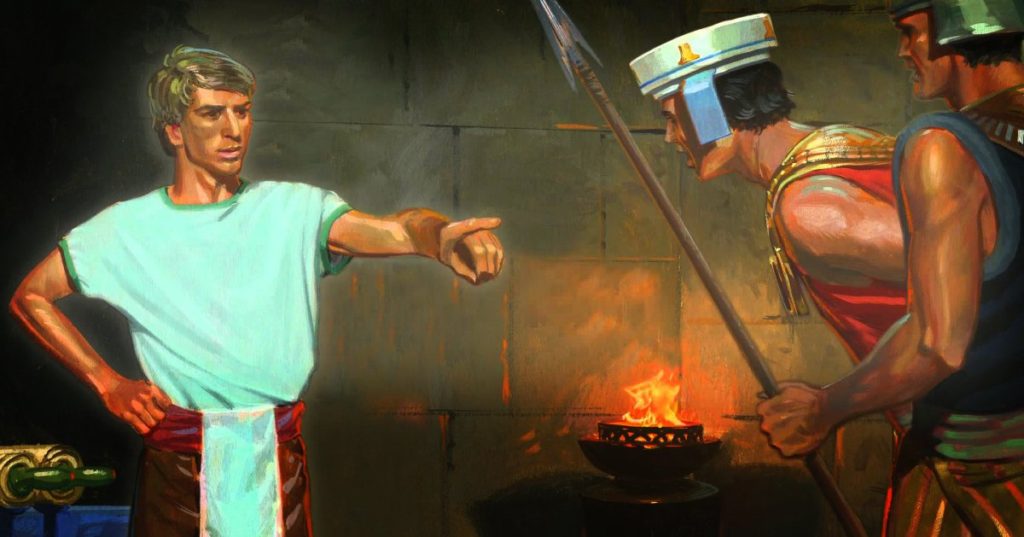
ALMA 1-4
Find a reference to support each of the following points that you believe is taught or implied in the indicated chapter. Cross out those you don’t believe to be true or don’t believe even Mormon would have found in the chapter. Then, for each chapter, pick the one or two points you think are the MOST important of the several points listed OR the points which most need additional emphasis.
ALMA 1
1. Capital punishment is an appropriate penalty for first degree murder.
2. We should wear clothing which is both inexpensive and attractive.
3. Church members in this chapter were a great example of patience.
4. Peace is determined by inward rather than external circumstances.
5. If we can afford to, we should be generous to those who are economically less fortunate.
6. Teachers aren’t any better than students.
7. On the average, Latter-day Saints are likely to be richer than non-members.
8. Those guilty of priestcraft should be executed.
9. It is important to have religious instruction on weekdays as well as on the Sabbath.
10. Church members should give as much to the poor as they own in excess of what the poorest in the community owns.
11. Church members should be concerned about needy non-members as well as needy members.
ALMA 2
1. One mark of a righteous military leader in Alma’s day was a willingness to lead rather than send his troops into battle.
2. Monarchy is a dangerous institution.
3. Political decisions are best made by the people themselves.
4. The Lord can and will protect the righteous in battle.
5. Military alliances are a sign of a serious lack of faith.
6. Sometimes it’s okay even for religious leaders to kill people.
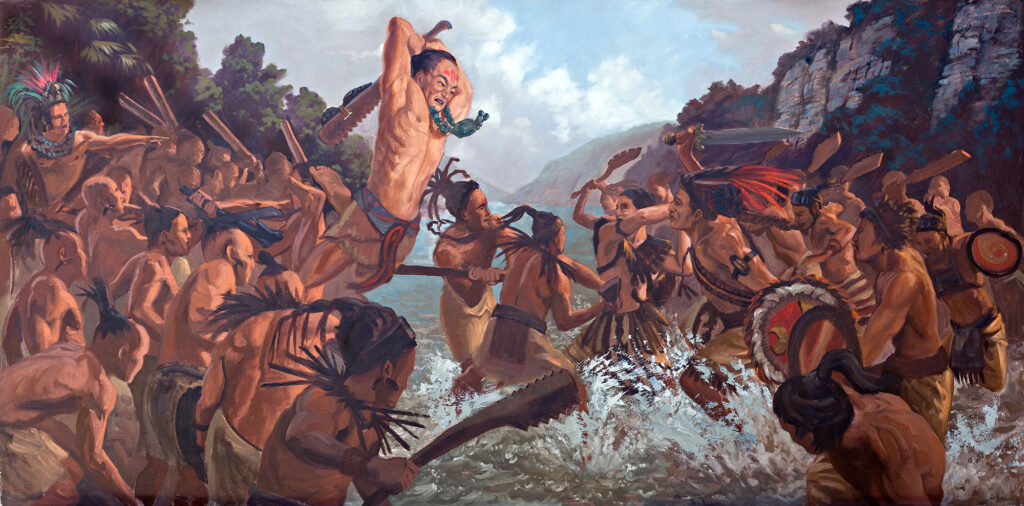
ALMA 3
1. Burying the dead is an important part of the responsibilities of righteous warriors.
2. Having a dark skin is a curse from God.
3. It is important to marry within one’s own faith.
4. Anyone who receives a “curse,” brings it upon himself.
5. We are free to choose happiness or misery, the wages of God or those of Satan.
ALMA 4
1. A bad example on the part of church members can keep others from joining.
2. In order to retain a remission of sins, one needs to be willing to help the less fortunate.
3. Preaching is more likely to change society than legislation.
4. A righteous person should buy cheap clothes rather than expensive ones.
5. War can be good for people.
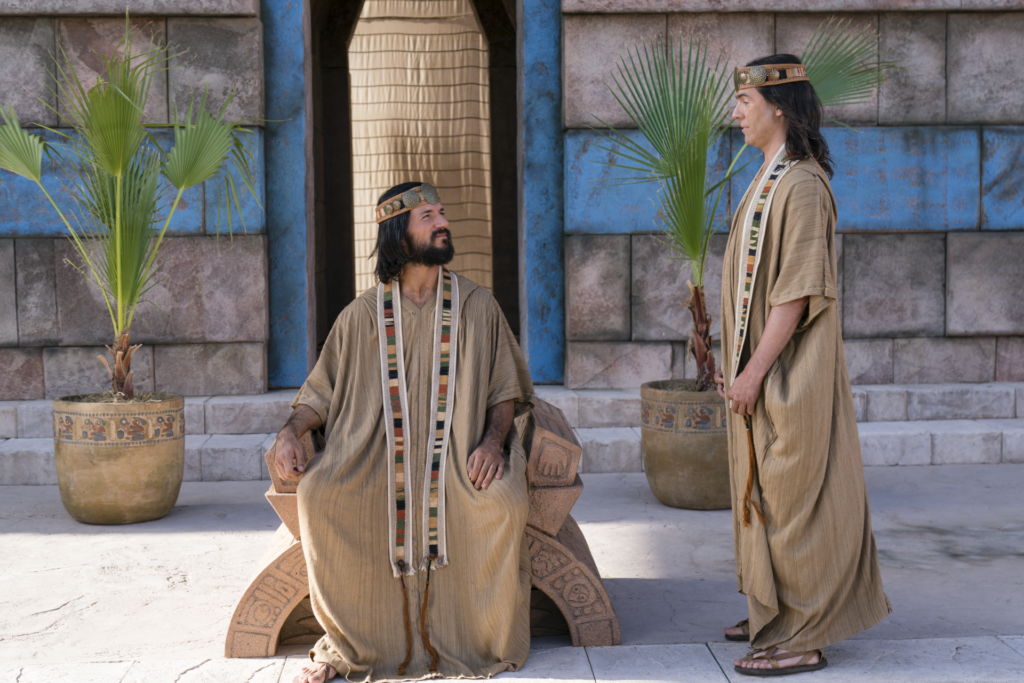
Alma gives up the chief judge position to Nephihah
Possible Answers to Points to Ponder in Mosiah 29 to Alma 4
MOSIAH 29
1. What are the advantages of a democracy as opposed to a monarchy? What are the disadvantages? Which form of government do we have in the Church?
The average democracy is less likely to be tyrannical than the average monarchy. Democracies, however, are decidedly inefficient and subject to the influence of demagogues. The best form of government, according to the Book of Mormon, would be a monarchy, if and only if we could be guaranteed we would always have kings like Mosiah and Benjamin. But because we cannot, democracy (or, better said, a democratic republic) is the better current alternative. The government of the Church is a theocracy, which is more like a good monarchy than a democracy, though there are democratic elements which allow members to sustain or abstain from sustaining their leaders on a regular basis.
2. If democracy is superior to monarchy, why do you suppose inspired Nephite prophets established a monarchy for the first 500 years of Nephite history?
As noted above, democracy is not inherently superior to monarchy. The reigns of the first Nephite kings (Nephi and his successors down through Mosiah the 2nd) were all superior to a democracy. But with the then recent experience of King Noah, the Nephites realized that the dangers of a bad monarchy outweighed the benefits of a good one, and they cheerfully accepted the change to the rule of the judges.
3. What dangers does a nation face when the majority of the people become wicked? Do you feel we have yet reached the point “that the voice of the people doth choose iniquity” in this country? (29:27) Why or why not?
When the majority becomes wicked, the nation faces the judgments of God. It is debatable whether or not we have reached that point in our country. Polls on attitudes toward abortion, gay marriage, and other social issues lead one to wonder. Happily, the Book of Mormon also teaches that a righteous minority have the power to cause the blessings of heaven to continue with a people even when the majority turns wicked, until such point as the wicked cast out the righteous from among them.
4. How would you feel about President Nelson serving simultaneously as President of the Church and President of the USA? Why was Alma given both positions?
Both the Nephite nation and the Nephite church were significantly smaller in Alma’s day. Moses also held both positions, as did Melchizedek and other ancient prophets. But in today’s pluralistic and much more complex society, it would be utterly impractical for one man to occupy both positions, no matter how desirable it might seem in theory.
ALMA 1-4
Find a reference to support each of the following points that you believe is taught or implied in the indicated chapter. Cross out those you don’t believe to be true or don’t believe even Mormon would have found in the chapter. Then, for each chapter, pick the one or two points you think are the MOST important of the several points listed OR the points which most need additional emphasis.
There are no probably right or wrong answers as to which points Mormon would have deemed most important, but those in bold represent my opinion on the subject. Those crossed out are not taught at all in the chapter, so far as I can tell.
ALMA 1
- Capital punishment is an appropriate penalty for first degree murder. [1:13]
- We should wear clothing which is both inexpensive and attractive. [1:27]
- Church members in this chapter were a great example of patience. [1:25]
- Peace is determined by inward rather than external circumstances. [1:28]
- If we can afford to, we should be generous to those who are economically less fortunate. [1:30]
- Teachers aren’t any better than students. [1:26]
- On the average, Latter-day Saints are likely to be richer than non-members. [1:31]
Those guilty of priestcraft should be executed.[Nehor was executed for murder, not priestcraft.]- It is important to have religious instruction on weekdays as well as on the Sabbath. [1:26]
Church members should give as much to the poor as they own in excess of what the poorest in the community owns.- Church members should be concerned about needy non-members as well as needy members. [1:30]
ALMA 2
- One mark of a righteous military leader in Alma’s day was a willingness to lead rather than send his troops into battle. [2:16]
- Monarchy is a dangerous institution. [2:4]
- Political decisions are best made by the people themselves. [2:3]
- The Lord can and will protect the righteous in battle. [2:18-19, 30-31]
Military alliances are a sign of a serious lack of faith.- Sometimes it’s okay even for religious leaders to kill people. [2:30-31]
ALMA 3
Burying the dead is an important part of the responsibilities of righteous warriors.Having a dark skin is a curse from God.- It is important to marry within one’s own faith. [3:6-8]
- Anyone who receives a “curse,” brings it upon himself. [3:19]
- We are free to choose happiness or misery, the wages of God or those of Satan. [3:26]
ALMA 4
- A bad example on the part of church members can keep others from joining. [4:10]
- In order to retain a remission of sins, one needs to be willing to help the less fortunate. [4:13-14]
- Preaching is more likely to change society than legislation. [4:19]
- It can be dangerous to wear expensive clothes. [4:6]
- War can be good for people. [4:3-4]
